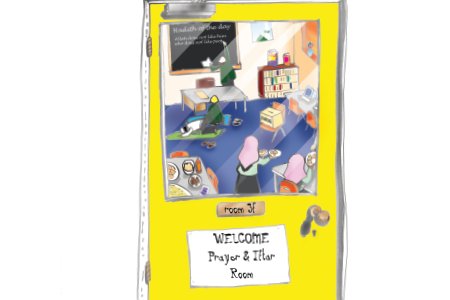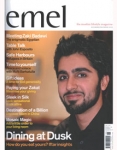
Ramadan in the Classroom
Issue 2 Nov / Dec 2003
Having left school some fourteen years ago, Saiqa Aslam finds out whether fundamental aspects of Ramadan can be played out in the classroom.
Given that the vast majority of schools in the UK have few Muslim students it is unsurprising that Ramadan does not feature in the events calendar of most of them. In those schools where there are large concentrations of Muslims Ramadan does receive some recognition; many will, for instance, make rooms available for prayer.
Ramadan is a wonderful opportunity to enlighten others about Islam. Lubna Ashraf, Curriculum Coordinator at Al Hijrah Primary School in Birmingham, has many years of experience as a teacher in a variety of state schools. She is firm in her belief that more could be done by parents and children to raise awareness about Ramadan. “Many schools will invite speakers to address children on Islam and Ramadan but very few tend to go beyond this. Teachers across the country are notoriously over-stretched and many have little knowledge about Ramadan. However, most will be receptive of advice and suggestions. Parents in particular have to be much more proactive and provide suggestions for creative and interesting activities in Ramadan.”
Tahir Alam a Birmingham LEA Governor Trainer and a member of the Muslim Education Bureau is disappointed at the absence of enjoyable and educational activities; “ school activities in Ramadan are few and far between. The importance of such activities lies in informing those around our children about Ramadan but also in instilling a sense of pride in Muslim children, a sense of achievement and the obvious understanding from their peers and teachers”.
Shereen Cameron, 17, is a sixth form pupil at Henrietta Barnett School (The Sunday Times School of the Year) in London. She enjoyed Ramadan at the school: “We put together presentations on Ramadan for the lower school, we held prayers, had iftars together and organised a great Eid party to which the whole school was invited. The atmosphere was fantastic. We had to take the initiative but we found the teachers to be openminded and supportive.”
Sponsored fasts or other fundraising activities are also a significant way in which schools can celebrate Ramadan. Giving to charity is a fundamental aspect of Islam and Ramadan is a time when Muslims are most conscious of this obligation. As Shereen remembers, “In my last year at Al Furqan School in Birmingham we raised almost £3000 – it was so amazing!”
Given that so little does actually happen in most schools it is unsurprising that many Muslim children experience a sense of alienation and isolation in Ramadan. Many potter around the playground whilst the rest of the school crowds into the lunch hall or canteen. However, the strength and resilience of Muslim children is not to be under-estimated. Hamza Fletcher, aged ten, fasted the whole of Ramadan last year and was never tempted to abort a fast even though he had been advised by his mother that he could if he felt unwell, tired or extremely hungry. One of only a few Muslims in his school he found great support from one of his friends, Ben, who gave up his lunch everyday and played with Hamza whilst all the other children ate.
Swimming and other sports remain difficult issues for schools in Ramadan. Forming as they do a fundamental aspect of the Curriculum there can be no suspension of such activities, however, schools should show some sensitivity to the needs of fasting children and should be conscious of allowing breaks or sit outs. Very few children withdraw completely from PE or swimming but these two issues remain fraught with difficulty in most schools. Tahir Alam has dealt with a variety of schools over the last few years and is troubled by the confusion. “Teachers need clarity but as long as there is diversity and difference amongst Muslims, confusion will remain. This is where the role of parents and governors is crucial because they can step in and provide that clarity and consistency.”
Although Ramadan does present Muslim parents, children and governors with a whole array of problems one of the most enriching aspects of the month is the power it has in bringing about change in those that observe it. Obaidullah Siddiq a teacher recalls with fondness the striking change in atmosphere at one Walsall School that he taught at. “What was quite remarkable was the transformations of character that many of the more ‘troublesome’ or ‘disruptive’ pupils would undergo in Ramadan. They would be noticeably calmer, quieter, more deferential and more co-operative.”
Hafsah FitzGibbon, 17, too found that there was a much greater sense of unity and togetherness amongst the Muslims at a Girls School with a large number of Muslim students. “I found myself exchanging knowing glances and greetings with other Muslim girls in the school. The prayer room that we were given also helped in providing a place where we could gather and spend time to get to know each other.”
In a world where Islam is associated with so much that is negative, Ramadan provides Muslims parents, teachers, governors and children a unique opportunity to meaningfully address these issues. School is an ideal place to present the positive aspects of Islam and Ramadan, as it is a place of learning where Muslim and non-Muslim sit side by side. Children are naturally curious and will instinctively incline towards respecting religious and cultural diversity. How then will we use our Ramadan? That is the challenge that faces us all.
Suggestions for Activities
Assemblies about Ramadan
Collective Worship sessions
Iftar events – sharing food always works!!
Iftars need not be complex affairs but simple foods, dates, fruit and sandwiches should suffice. If it proves too awkward to organise for large numbers confine it to one class.
Charity events or fundraising activities
The ideal way of shifting the focus from mere abstinence from food and drink. Sponsored fasts are the obvious and most relevant way of raising money.
Half day fasts
An excellent way of encouraging non-Muslim children to share the experience of fasting.
Eid parties
A wonderful way of bringing people together. Many schools are happy to have such parties but if it proves difficult, your home or the Mosque will be great venues. Making Eid cards is also a fun and exciting activity for younger children.
Advice to Parents
Familiarise yourselves with the MCB ‘Guidance to Schools on Arrangements for Muslim Pupils during the month of Ramadan.’ You can also suggest that it be made available to all teachers in the school. www.mcb.org.uk
For underage children provide very clear instructions about aborting fasts given that children are not under an obligation to fast.
For children who are obliged to fast, inform teachers of circumstances under which the fast is or can be broken.
Should you want to withdraw your child from any activities be clear about such withdrawal and expect to be challenged! Be firm with staff and ensure that your child’s position on such matters is also clear.
Encourage school staff to be sensitive to those that are fasting, in particular, to those undertaking physically demanding activity.
Muslim Education Bureau advises parents, teachers, governors and children on any issues relating to schools and education – 0845 166 1138
Bookmark this |
|
Add to DIGG |
|
Add to del.icio.us |
|
Stumble this |
|
Share on Facebook |
|
Share this |
|
Send to a Friend |
|
Link to this |
|
Printer Friendly |
|
Print in plain text |
|


Comments
0 Comments